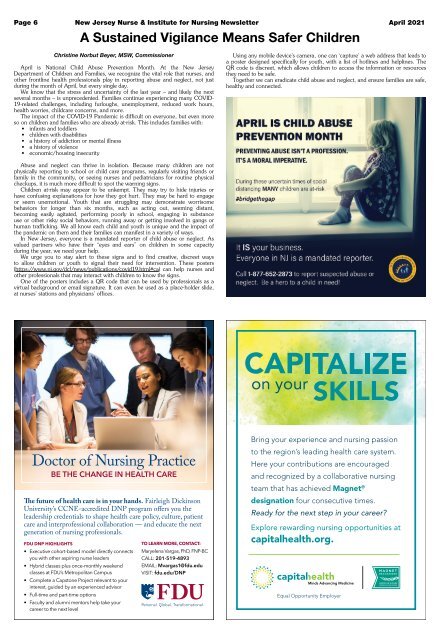New Jersey Nurse - April 2021
You also want an ePaper? Increase the reach of your titles
YUMPU automatically turns print PDFs into web optimized ePapers that Google loves.
Page 6 <strong>New</strong> <strong>Jersey</strong> <strong>Nurse</strong> & Institute for Nursing <strong>New</strong>sletter <strong>April</strong> <strong>2021</strong><br />
A Sustained Vigilance Means Safer Children<br />
Christine Norbut Beyer, MSW, Commissioner<br />
<strong>April</strong> is National Child Abuse Prevention Month. At the <strong>New</strong> <strong>Jersey</strong><br />
Department of Children and Families, we recognize the vital role that nurses, and<br />
other frontline health professionals play in reporting abuse and neglect, not just<br />
during the month of <strong>April</strong>, but every single day.<br />
We know that the stress and uncertainty of the last year – and likely the next<br />
several months – is unprecedented. Families continue experiencing many COVID-<br />
19-related challenges, including furloughs, unemployment, reduced work hours,<br />
health worries, childcare concerns, and more.<br />
The impact of the COVID-19 Pandemic is difficult on everyone, but even more<br />
so on children and families who are already at-risk. This includes families with:<br />
• infants and toddlers<br />
• children with disabilities<br />
• a history of addiction or mental illness<br />
• a history of violence<br />
• economic/housing insecurity<br />
Using any mobile device’s camera, one can ‘capture’ a web address that leads to<br />
a poster designed specifically for youth, with a list of hotlines and helplines. The<br />
QR code is discreet, which allows children to access the information or resources<br />
they need to be safe.<br />
Together we can eradicate child abuse and neglect, and ensure families are safe,<br />
healthy and connected.<br />
Abuse and neglect can thrive in isolation. Because many children are not<br />
physically reporting to school or child care programs, regularly visiting friends or<br />
family in the community, or seeing nurses and pediatricians for routine physical<br />
checkups, it is much more difficult to spot the warning signs.<br />
Children at-risk may appear to be unkempt. They may try to hide injuries or<br />
have confusing explanations for how they got hurt. They may be hard to engage<br />
or seem unemotional. Youth that are struggling may demonstrate worrisome<br />
behaviors for longer than six months, such as acting out, seeming distant,<br />
becoming easily agitated, performing poorly in school, engaging in substance<br />
use or other risky social behaviors, running away or getting involved in gangs or<br />
human trafficking. We all know each child and youth is unique and the impact of<br />
the pandemic on them and their families can manifest in a variety of ways.<br />
In <strong>New</strong> <strong>Jersey</strong>, everyone is a mandated reporter of child abuse or neglect. As<br />
valued partners who have their “eyes and ears” on children in some capacity<br />
during the year, we need your help.<br />
We urge you to stay alert to these signs and to find creative, discreet ways<br />
to allow children or youth to signal their need for intervention. These posters<br />
(https://www.nj.gov/dcf/news/publications/covid19.html#ca) can help nurses and<br />
other professionals that may interact with children to know the signs.<br />
One of the posters includes a QR code that can be used by professionals as a<br />
virtual background or email signature. It can even be used as a place-holder slide,<br />
at nurses’ stations and physicians’ offices.

















